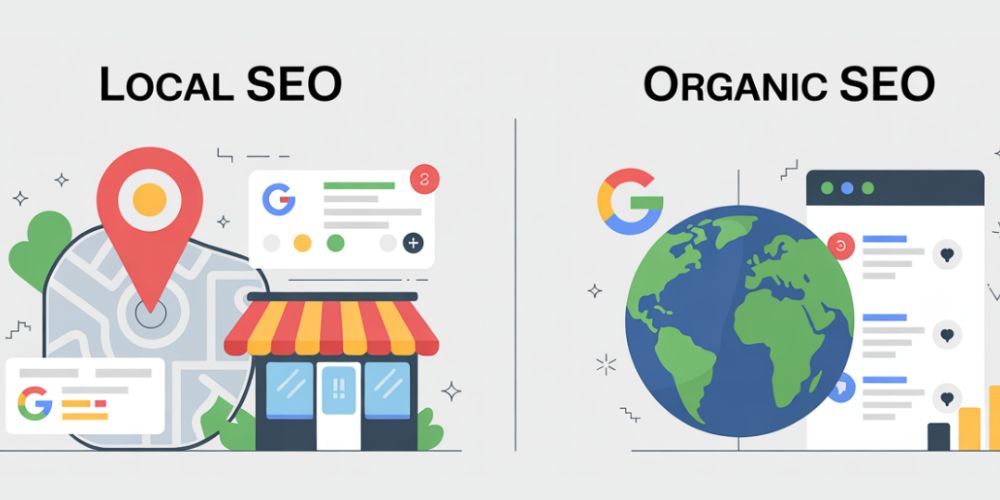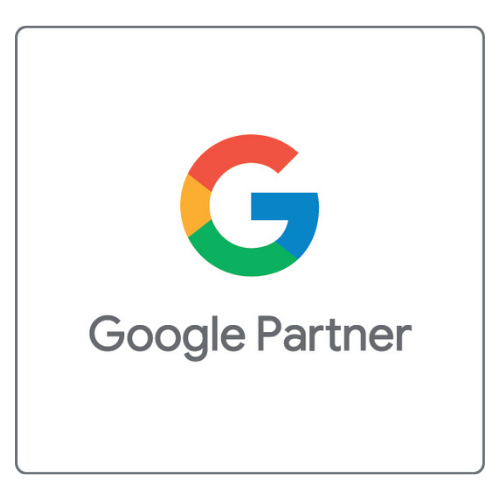Your business might be invisible, and you don’t even know it.
If people can’t find you when they search for your services, they’re going to your competitors instead.
The fix?
Getting good at SEO.
However, there are two main types of SEO: local and organic. Which one do you need? Let’s figure it out, so the right customers can actually find you.
What Is Organic SEO?
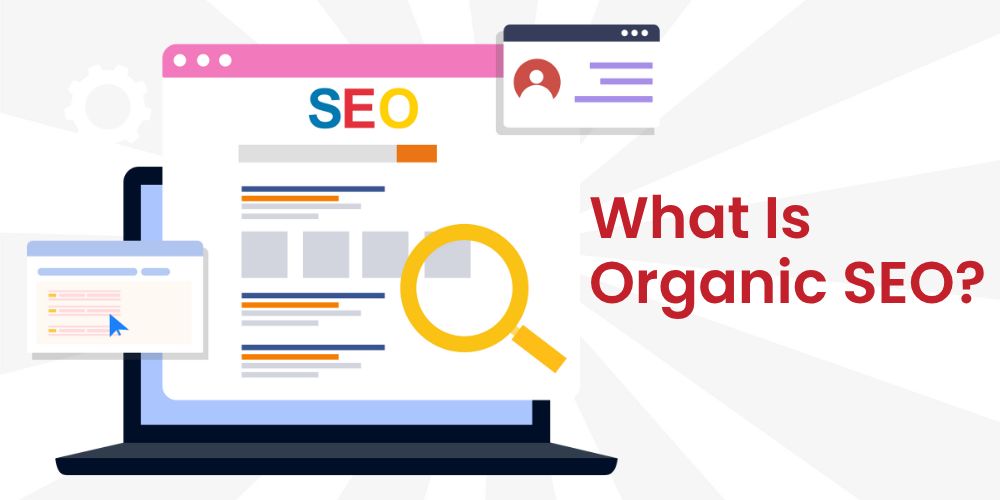
Organic SEO is all about getting your website to show up naturally in search results, without paying for ads.
When someone searches for something you offer, organic search engine optimization helps your site appear in the regular search listings.
It’s called “organic” because you earn these spots through good content, smart keywords, and a well-built website, not by paying Google.
The goal is to attract organic traffic—people who find you naturally through their searches.
It takes time, but once you’re ranking, you’ll earn steady visitors without paying for every click.
If you’re running paid ads too, consider optimizing your performance. Here’s how to improve Google Ads CTR and get better ROI
What is Local SEO?

Local SEO is about getting your business found by people searching in your area.
When someone types “restaurant near me” or “dentist in Chicago,” local SEO helps your business show up in those location-based results.
Local SEO targets people who are ready to visit your physical location or use your services nearby.
It’s perfect for restaurants, shops, doctors, plumbers, and any business that serves customers face-to-face.
The best part?
Local searches often lead to faster sales because people are already looking for something nearby.
Local SEO is a game-changer for small and mid-sized businesses that rely on foot traffic or service areas.
It’s powered by:
- Your Google Business Profile
- Reviews and ratings
- Business directories
- Proximity to the searcher
Want to know why it matters? Here’s how local SEO can directly boost your revenue.
Key Differences Between Local SEO and Organic SEO
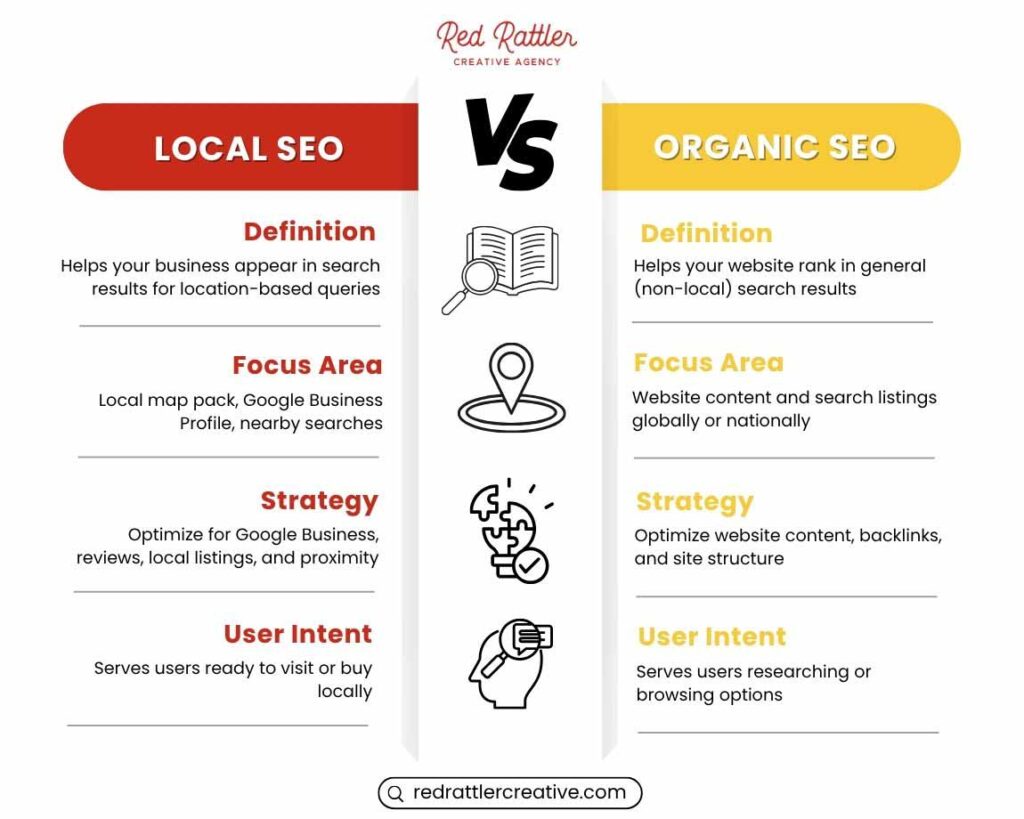
Local SEO helps people in your area find you. Organic SEO helps people everywhere find you. Let’s see how they’re different.
1. Targeting
Organic SEO reaches people who search for your topics everywhere—nationally or globally.
Local SEO for businesses targets customers in your specific geographic area who need services nearby.
2. Ranking Factors
Organic search engine optimization focuses on quality content, backlinks from other websites, and technical website performance.
Local SEO depends on your Google My Business profile, customer reviews, business listings, and how close you are to the searcher.
3.User Intent
People doing organic searches are often researching or comparing options over time. Local searchers have immediate needs—they want to call, visit, or buy something today.
That’s why “near me” searches often lead to phone calls or store visits within hours, while organic SEO might nurture visitors over weeks or months before they convert.
4.Search Results Display
Organic SEO appears in the main search results as blue links with descriptions.
Local SEO influences where your business appears in Google’s map pack—the section with a map and the top three local listings.
It also boosts visibility in your Google Business Profile and across local directories, where searchers see photos, reviews, and contact information.
5.Competition Level
Organic SEO competes against millions of websites worldwide for popular keywords.
Local SEO competes mainly against other businesses in your city or neighborhood, making it easier to rank if you optimize correctly.
How Do They Work Together?
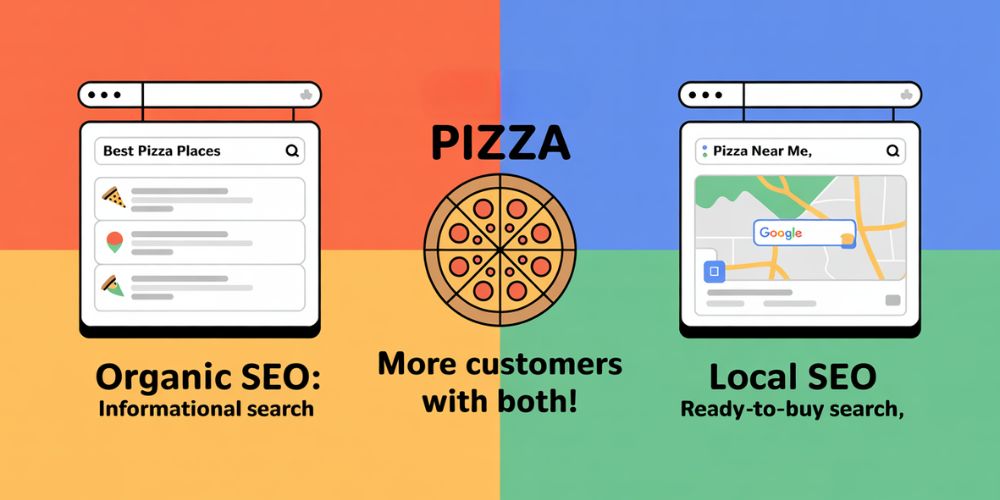
Here’s the deal: you don’t need to pick between local SEO and organic SEO. They’re actually stronger when you use them together.
Think about how people search. Someone might start by searching “best pizza places” to see what’s out there. Later, when they’re hungry, they search “pizza near me.”
If you only focus on organic SEO, you’ll miss that second search. If you only do local SEO, you’ll miss people who are just browsing around.
When you use both, you catch more customers.
Your organic SEO helps you show up for big topics that bring in visitors who are just discovering you. Your local SEO makes sure nearby customers find you when they’re ready to buy.
The content you write for organic search also helps your local rankings.
Blog posts about your business show Google that you’re an authority, which also boosts your local search visibility.
Customer reviews from local SEO make your whole website look better for organic search.
Your Google My Business page sends people to your website, whereas your organic content keeps them interested.
People who find you through organic search might leave reviews or visit your store, which helps your local rankings.
Using both also saves you time and money. The keyword research you do for organic SEO shows you local search opportunities.
What you learn from local customers helps you write better organic content. Instead of running two separate plans, you build one stronger strategy.
Businesses that use both local and organic SEO get better results than those using just one.
You reach customers at every step – from when they’re just looking around to when they’re ready to buy.
Which One Is More Important?
It depends on your business and what you’re trying to achieve.
Here’s a simple way to think about it: If you sell products online or serve customers nationwide, organic SEO should be your main focus.
Online stores, software companies, and digital services need to show up when people search for products or solutions anywhere in the country.
But if you’re a local business that serves customers face-to-face, local SEO for businesses is your bread and butter.
Restaurants, dentists, plumbers, and hair salons need people in their area to find them. What is local SEO good for? Getting customers through your door.
That said, most businesses actually benefit from both, as discussed earlier.
Even local businesses can use organic SEO to build authority and attract customers from nearby towns. And even national companies often have local offices or want to target specific regions.
Here’s how they work: local SEO gets you quick wins with nearby customers who are ready to buy. Organic SEO builds long-term growth by bringing in people who might not know you exist yet.
The smartest approach? Start with whichever matches your immediate business goals, then gradually add the other.
A local restaurant might focus on local SEO first, then add organic content about cooking tips. An online store might start with organic SEO, then optimize for local searches in key markets.
Wrapping Up…
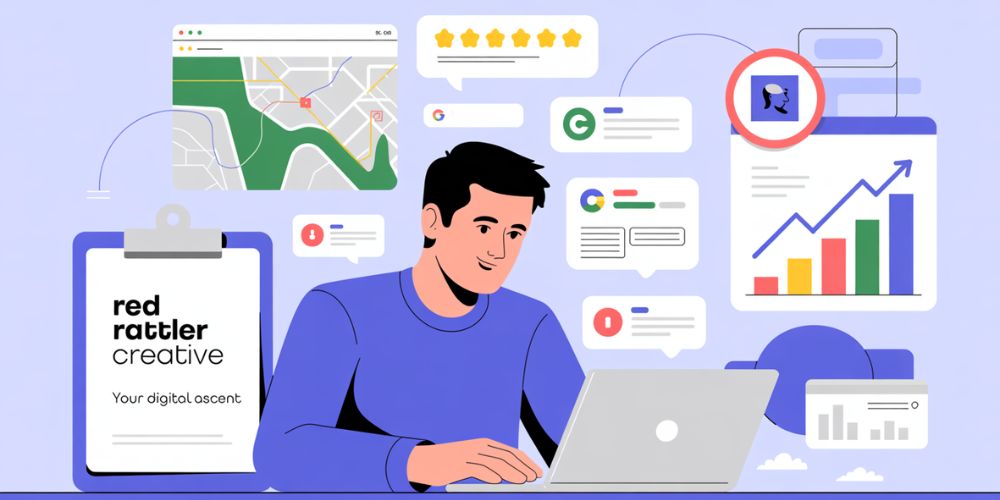
Getting the most from SEO means using both local and organic strategies to connect with more customers.
Whether your business serves the block or the whole country, having the right approach drives real results.
Red Rattler Creative can help you convert those searches into actual sales—let’s get started.
Frequently Asked Questions
1 What are the 4 types of SEO?
- The four main types of SEO are:
- On-Page SEO – Optimizing individual web pages with keywords, quality content, and proper HTML tags.
- Off-Page SEO – Building backlinks and authority through external efforts like link building and social signals.
- Technical SEO – Improving site performance, mobile-friendliness, crawlability, and indexability for search engines.
- Local SEO – Optimizing your business for local search results using Google Business Profile, local citations, and reviews.
2 What is the difference between local SEO and SEO?
- Local SEO focuses on improving your visibility in searches within a specific geographic area (e.g., “plumber near me”).
- General SEO (often referring to organic SEO) targets a broader audience and aims to rank for keywords that aren’t tied to a location.
3 What is the difference between SEO and organic search?
- SEO (Search Engine Optimization) is the strategy used to improve your website’s visibility.
- Organic search refers to the actual unpaid search results users see, which are driven by SEO strategies. SEO helps you rank in organic search.
4 Is local SEO still relevant?
- Yes, local SEO is more relevant than ever, especially for businesses with physical locations or service areas.
- Most local searches (like “coffee shop near me”) lead to in-person visits or phone calls, often within the same day.
5 What is the main goal of local SEO?
- The goal of local SEO is to get your business found by people searching for services in your geographic area, especially on Google Maps and local listings.
6 How does organic SEO drive long-term traffic?
- Organic SEO builds sustainable traffic by improving your site’s relevance, authority, and user experience, helping you rank for valuable keywords without paying for ads.

